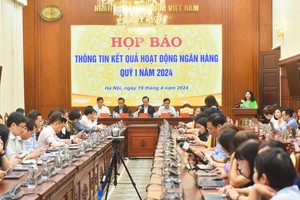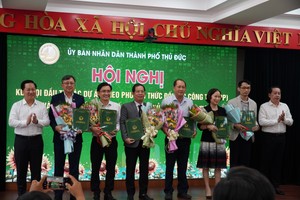 Business management software helps businesses access electronic invoices easily and quickly. (Photo: SGGP)
Business management software helps businesses access electronic invoices easily and quickly. (Photo: SGGP)
According to the provisions of the Law on Tax Administration, it is not until mid-2022 that Vietnam will implement e-invoices. However, according to Decision No.1832 of the Ministry of Finance (MoF), HCMC and five other provinces and cities, namely Hanoi, Hai Phong, Quang Ninh, Binh Dinh, and Phu Tho have met the conditions for infrastructure, so they must apply e-invoices from the beginning of November this year. Meanwhile, e-invoices under the new regulations are far different from the concept of e-invoices under the old ones. Specifically, in the past, e-invoices were made on electronic devices (mostly printed from computers). Now, Circular No.78 of the MoF stipulates that e-invoices include the following types: invoices with tax authority codes, invoices without codes (invoices of infrastructure enterprises, such as electricity, water, and telecommunications), and invoices from cash registers that connect to tax authorities and completely run on technology platforms without the need to print. According to Mr. Thai Minh Giao, Deputy Director of the HCMC Tax Department, HCMC has 173,500 businesses using e-invoices under the old regulations, accounting for 75 percent. However, only 118 enterprises have been piloted e-invoices with authentication codes, meaning that they meet the conditions of the new regulations. Thus, the number of remaining enterprises is very high. Mr. Nguyen Quoc Hung, a representative of a company in District 1, said that his company had to deploy e-invoices under new regulations in November. Nevertheless, the training on the application of e-invoices under new regulations was organized at the beginning of November while the city had just passed the peak of the Covid-19 pandemic. Therefore, he could not prepare anything in time. Mr. Vo Quoc Viet, a representative of a business in Tan Binh District, said that many enterprises could not do business in the past few months, so a large number of invoices remained. He suggested tax authorities create conditions for businesses to continue using the number of remaining invoices issued under the transitional terms of Circular No.78 to avoid waste. Moreover, according to the provisions on invoices of the Tax Administration Law, previously, exporting enterprises used commercial invoices. Now, the new regulations force them to use value-added invoices, causing difficulties for enterprises. Many businesses complained that, previously, export invoices were forced to issue separately as commercial invoices. These invoices had not been used up but were discarded. Now, it is the turn of value-added invoices. According to these enterprises, for having synchronized, export invoices are no longer needed because when exporting, they have already transmitted the customs declarations. Besides, foreign enterprises do not recognize the e-invoice of Vietnamese enterprises. Thus, invoices are mainly issued to be thrown away, but it increases costs for businesses, so this regulation needs to be amended.The benefits outweigh the costs “Technology is the trend of the times, but many businesses are still concerned that the application of e-invoices requires modern infrastructure and devices and wonder how to issue invoices if the network is congested. Small companies already have accountants, so they are reluctant to hire more IT staff to manage it,” said Nguyen Thi Phuong, a small trader at Binh Dien Market. Mr. Pham Tri Dung, Head of the Propaganda and Support Department of the HCMC Tax Department, explained that enterprises and business households do not need to hire IT staff but can sign a contract with a data transmission service unit, like the previous contract to provide e-invoices. Enterprises will be provided with the software, and this software helps businesses transmit data to the tax authorities when they transfer invoices to customers. If there is a problem with the network, enterprises can temporarily use the invoice provided by the tax authorities. According to some small traders at An Dong Market, e-invoices are quite complicated to apply. It is difficult for small businesses to meet the requirements of technology. The MoF promulgated Circular No.88, guiding the accounting regime for business households and individuals paying tax under the declaration method, effective in early 2022. Accordingly, business households and individuals may choose to apply the micro-enterprise accounting regime. It even allows business households to arrange for family members to work as accountants without requiring an academic degree as prescribed. Dinh Thi Ngoc Thuy, in District 5, said that the Covid-19 pandemic had caused heavy damages to entrepreneurs. The application of e-invoices will increase costs, so it is necessary to have a tax support package for entrepreneurs. According to the HCMC Tax Department, if there are many difficult cases, the HCMC People's Committee will propose the MoF consider and have a support plan. As for the cost, businesses will find it heavy at first for not having been accustomed to it, but in the long run, the benefits brought by e-invoices are huge. Specifically, they can reduce the cost of printing invoices and managing invoices closely. They do not have to submit monthly and quarterly invoice declarations. Enterprises and customers can issue invoices anywhere, no need to travel or store invoices. More specifically, when applying e-invoices, the tax authorities can manage data timely, avoiding the case of counterfeit and illegal invoices as before.
The HCMC Tax Department established an e-invoices deployment center to support enterprises in converting and registering e-invoices according to the new regulations. Accordingly, businesses can call the hotline 028.3770.2288 for support.
























